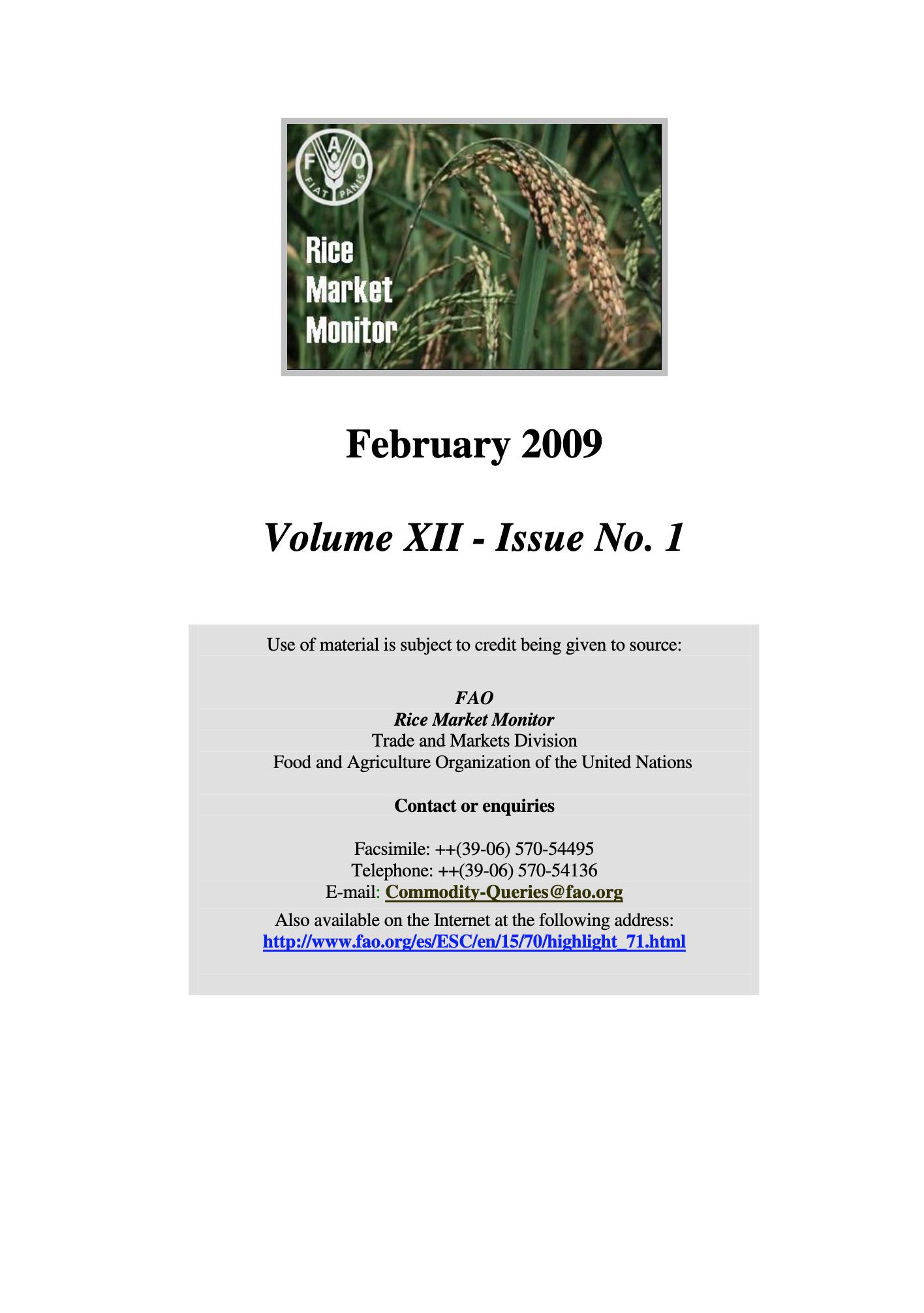
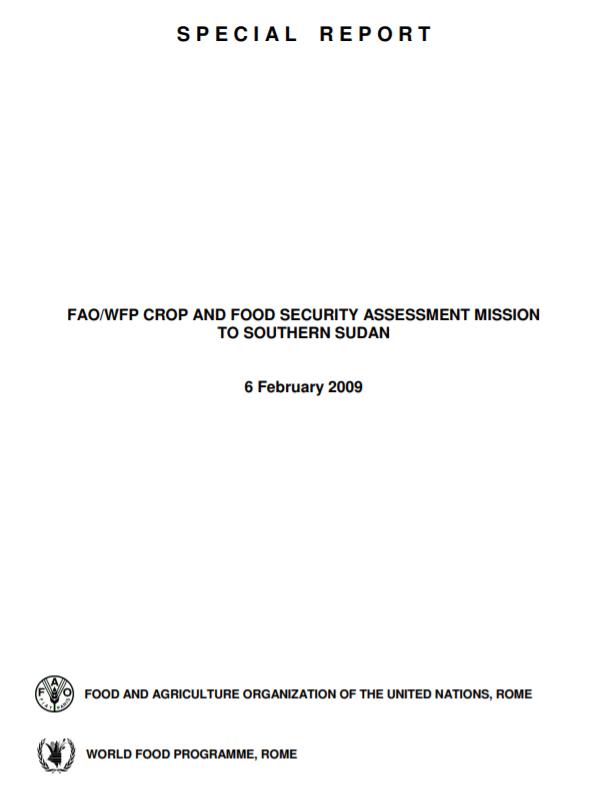
Special Report - FAO/WFP Crop and Food Security Assessment Mission to Southern Sudan - 6 February 2009
06/02/2009
An FAO/WFP Crop and Food Security Assessment Mission (CFSAM) worked in Southern Sudan from 2 to 26 October 2008 to estimate cereal production and assess the overall food supply situation. The Mission included representatives from the Government of Southern Sudan (GOSS), Ministry of Agriculture and Forestry (MoAF) and the Southern Sudan Relief and Rehabilitation Commission (SSRRC), the European Union’s Joint Research Centre (JRC) FEWSNet, WFP and FAO.
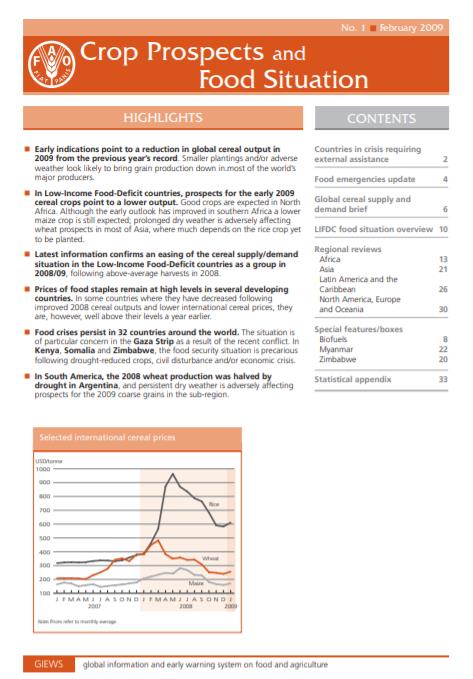
Crop Prospects and Food Situation #1, February 2009
05/02/2009
Early indications point to a reduction in global cereal output in 2009 from the previous year’s record. Smaller plantings and/or adverse weather look likely to bring grain production down in most of the world’s major producers. In Low-Income Food-Deficit countries, prospects for the early 2009 cereal crops point to a lower output. Good crops are expected in North Africa. Although the early outlook has improved in southern Africa a lower maize crop is still expected; prolonged dry weather is adversely affecting wheat prospects in most of Asia, where much depends on the rice crop yet to be planted. Latest information confirms an easing of the cereal supply/demand situation in the Low-Income Food-Deficit countries as a group in 2008/09, following above-average harvests in 2008.
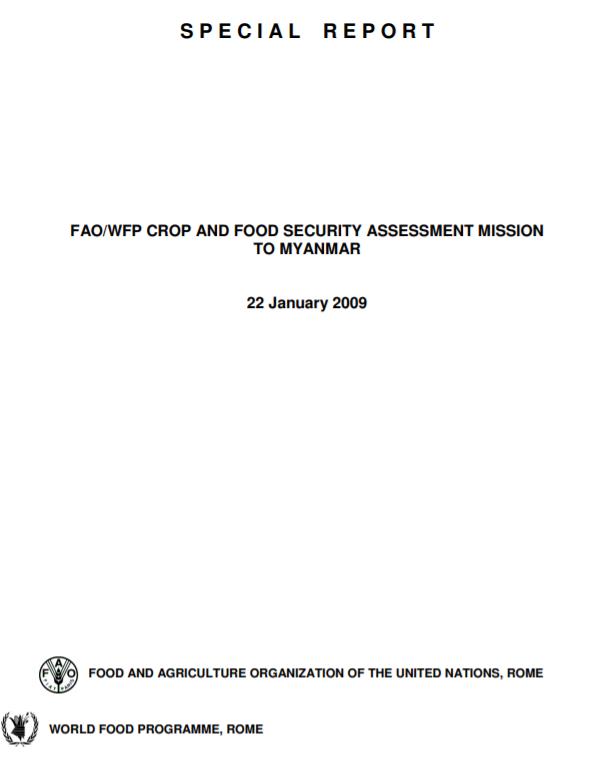
Special Report - FAO/WFP Crop and Food Security Assessment Mission to Myanmar - 22 January 2009
22/01/2009
At the request of the Ministry of Agriculture and Irrigation of Myanmar (MOAI), a joint FAO/WFP Crop and Food Security Assessment Mission (CFSAM)) team visited the country from 5 October to 4 November 2008. The main objective of the Mission was to analyze the food supply situation for the forthcoming year at the national and subnational levels (particularly in Cyclone Nargis-affected areas) and estimate food and agricultural assistance needs. Cyclone Nargis hit Myanmar on 2 and 3 May 2008, affecting the food security of approximately 2.4 million people in Ayeyarwady and Yangon Divisions, through damage to agricultural land, destruction of the livestock and fishery sectors and depletion of food markets. The Mission assessed the 2008 main-crop harvest, forecasted 2008/09 production of secondary crops, and estimated food aid requirements and agricultural assistance for the 2008/09 marketing year (November/October). This assessment also ascertained whether transport and marketing infrastructures have recovered from the disaster.
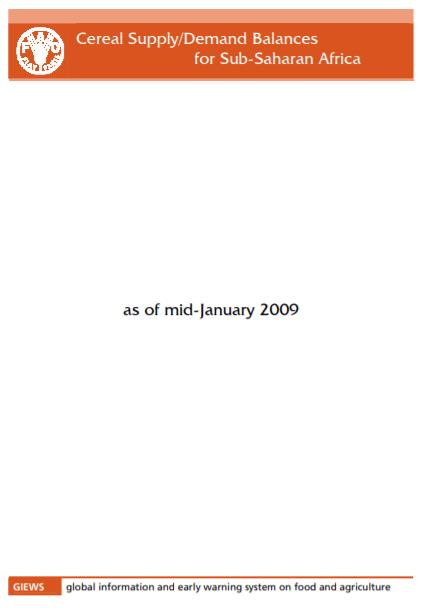
Cereal supply and demand balances for sub-Saharan African countries - No.1, January 2009
22/01/2009
The FAO/GIEWS Country Cereal Balance System (CCBS) is a database of annual supply and utilization balances for main cereals, covering all countries of the world. It has been maintained by FAO/GIEWS since 1980 and is updated on a continual basis. This statistical report, which is a subset of CCBS data, presents the current-year cereal supply and demand balances for all sub-Saharan African countries, highlighting cereal import and food aid requirements of each country. This report is complement ary to the FAO/GIEWS report Crop Prospects and Food Situation and is published four times a year, with the same schedule.
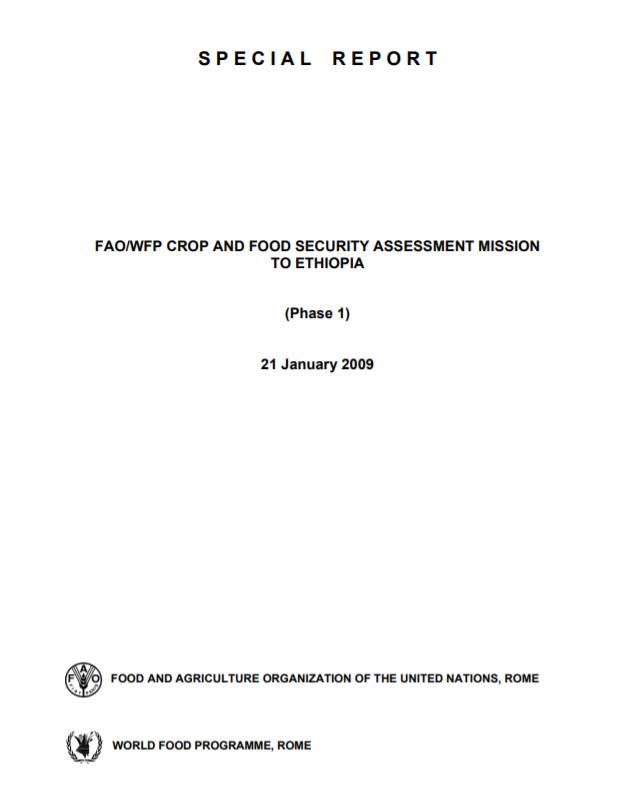
Special Report FAO/WFP Crop and Food Security Assessment Mission to Ethiopia (Phase 1)
21/01/2009
An FAO/WFP Crop and Food Security Assessment Mission visited Ethiopia from 16 November to 12 December 2008 to estimate the 2008 main meher season cereal and pulse production; review the 2008 secondary belg season harvests; forecast the 2009 belg season production; and assess the overall food supply situation for the 2009 marketing year (January/December). Accompanied by experts from the Ministry of Agriculture and Rural Development, the Central Statistics Authority (CSA) and by observers from USAID/FEWSNet and the Joint Research Centre of the European Commission (EC-JRC), the Mission mobilised seven teams and visited, over an 18-day period, 63 zones and special woredas (districts) covering all the grain producing regions and the marginal areas.
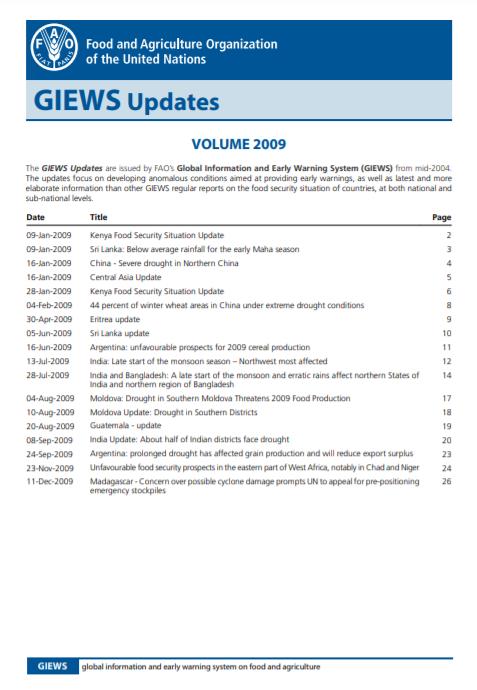
GIEWS Updates - Volume 2009
09/01/2009
The GIEWS Updates are issued by FAO’s Global Information and Early Warning System (GIEWS) from mid-2004. The updates focus on developing anomalous conditions aimed at providing early warnings, as well as latest and more elaborate information than other GIEWS regular reports on the food security situation of countries, at both national and sub-national levels.
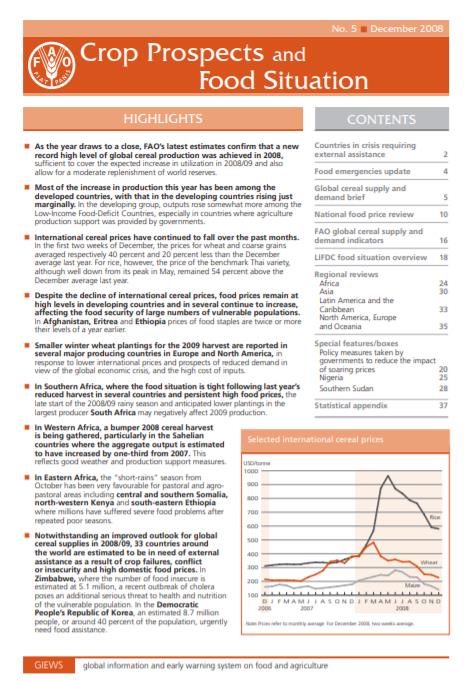
Crop Prospects and Food Situation #5, December 2008
11/12/2008
As the year draws to a close, FAO’s latest estimates confirm that a new record high level of global cereal production was achieved in 2008, sufficient to cover the expected increase in utilization in 2008/09 and also allow for a moderate replenishment of world reserves. Most of the increase in production this year has been among the developed countries, with that in the developing countries rising just marginally. In the developing group, outputs rose somewhat more among the Low-Income Food-Deficit Countries, especially in countries where agriculture production support was provided by governments.
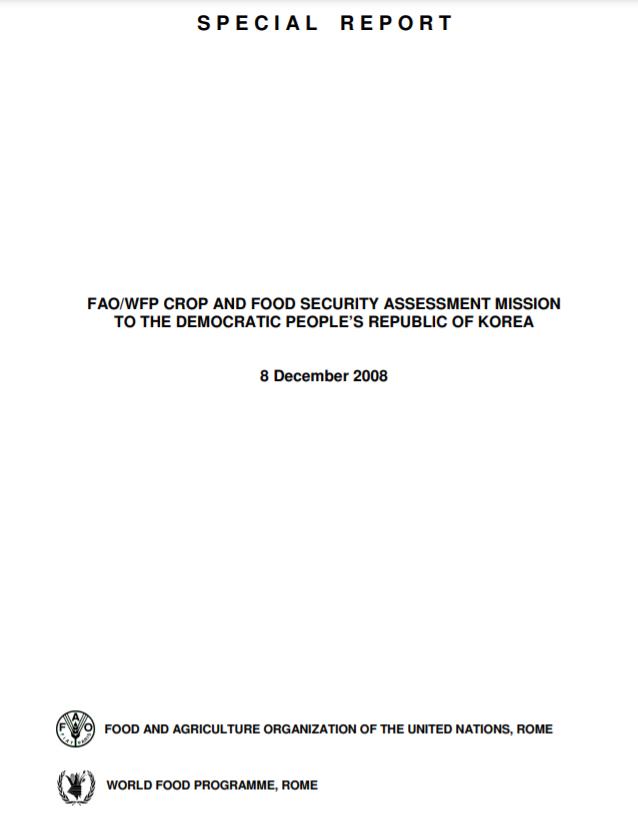
Special Report - FAO/WFP Crop and Food Security Assessment Mission to the Democratic People's Republic of Korea - 8 December 2008
08/12/2008
FAO and WFP conducted a Crop and Food Supply Assessment Mission (CFSAM) in the Democratic People’s Republic of (DPRK) from 9 through 24 October 2008. This was the first such exercise since 2004; in late 2005 the DPRK Government had decided to sharply curtail humanitarian assistance after a short series of good agricultural years. Until 2008, food aid operations by WFP and other actors had thus reduced considerably, and further CFSAMs were not deemed necessary by the DPRK Government. The relative improvement in the food balance, however, proved short-lived, especially since the country suffered severe flooding in 2007. As of early 2008, the terms of a new agreement between the DPRK Government and various parties included up to half a million tonnes of food aid from the United States, a Rapid Food Security Assessment (RFSA) to be conducted in June 2008 and a CFSAM scheduled for October.
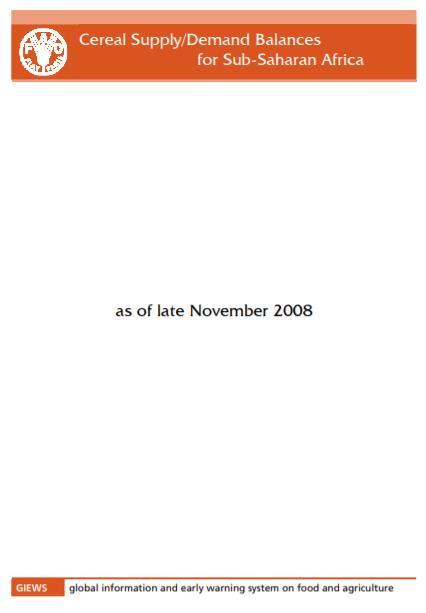
Cereal supply and demand balances for sub-Saharan African countries - No.5, November 2008
28/11/2008
The FAO/GIEWS Country Cereal Balance System (CCBS) is a database of annual supply and utilization balances for main cereals, covering all countries of the world. It has been maintained by FAO/GIEWS since 1980 and is updated on a continual basis. This statistical report, which is a subset of CCBS data, presents the current-year cereal supply and demand balances for all sub-Saharan African countries, highlighting cereal import and food aid requirements of each country. This report is complement ary to the FAO/GIEWS report Crop Prospects and Food Situation and is published four times a year, with the same schedule.
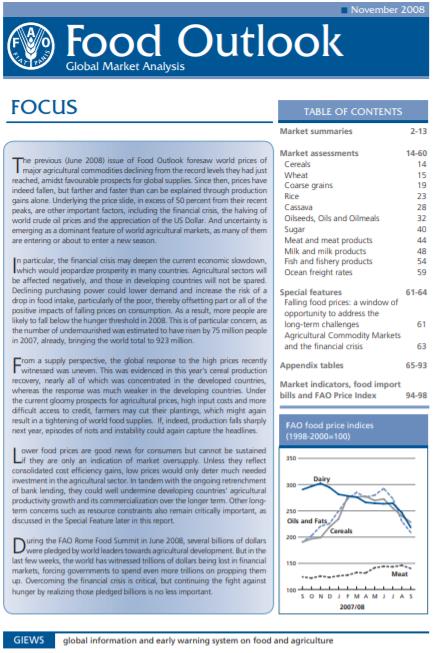
Food Outlook - November 2008
03/11/2008
The previous (June 2008) issue of Food Outlook foresaw world prices of major agricultural commodities declining from the record levels they had just reached, amidst favourable prospects for global supplies. Since then, prices have indeed fallen, but farther and faster than can be explained through production gains alone. Underlying the price slide, in excess of 50 percent from their recent peaks, are other important factors, including the financial crisis, the halving of world crude oil prices and the appreciation of the US Dollar. And uncertainty is emerging as a dominant feature of world agricultural markets, as many of them are entering or about to enter a new season.
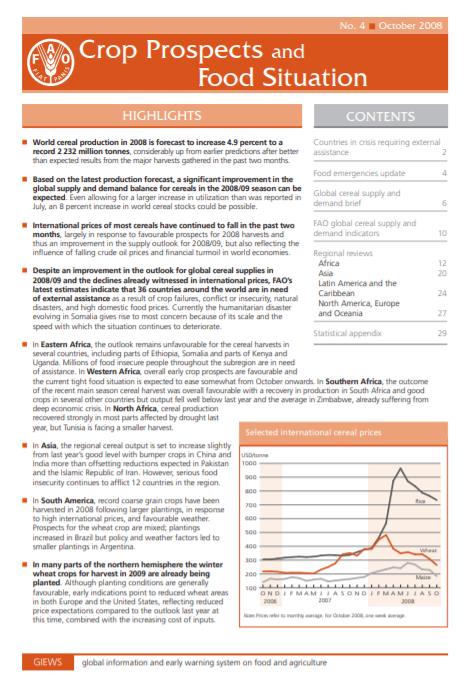
Crop Prospects and Food Situation #4, October 2008
09/10/2008
World cereal production in 2008 is forecast to increase 4.9 percent to a record 2 232 million tonnes, considerably up from earlier predictions after better than expected results from the major harvests gathered in the past two months. Based on the latest production forecast, a significant improvement in the global supply and demand balance for cereals in the 2008/09 season can be expected. Even allowing for a larger increase in utilization than was reported in July, an 8 percent increase in world cereal stocks could be possible. International prices of most cereals have continued to fall in the past two months, largely in response to favourable prospects for 2008 harvests and thus an improvement in the supply outlook for 2008/09, but also reflecting the influence of falling crude oil prices and financial turmoil in world economies.
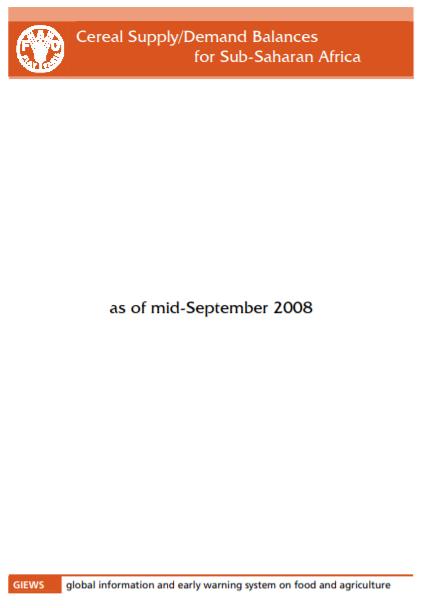
Cereal supply and demand balances for sub-Saharan African countries - No.4, September 2008
18/09/2008
The FAO/GIEWS Country Cereal Balance System (CCBS) is a database of annual supply and utilization balances for main cereals, covering all countries of the world. It has been maintained by FAO/GIEWS since 1980 and is updated on a continual basis. This statistical report, which is a subset of CCBS data, presents the current-year cereal supply and demand balances for all sub-Saharan African countries, highlighting cereal import and food aid requirements of each country. This report is complement ary to the FAO/GIEWS report Crop Prospects and Food Situation and is published four times a year, with the same schedule.
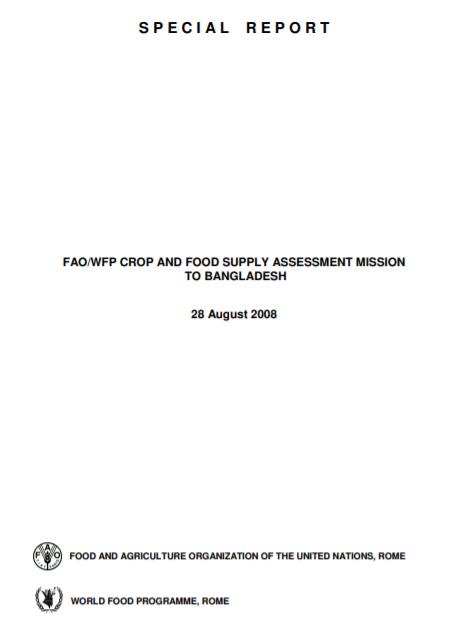
Special Report - FAO/WFP Crop and Food Supply Assessment Mission to Bangladesh
28/08/2008
Bangladesh suffered from widespread monsoon floods, followed by a severe cyclone resulting in the loss of an estimated 1.4 million tonnes of Aman rice in 2007. Food security of the country has been significantly and adversely affected by rising food prices. At the request of the Ministry of Agriculture of Bangladesh, a joint FAO/WFP Crop and Food Supply Assessment Mission visited the country from 14 April to 6 May 2008. The overall objective of the assessment was to estimate/forecast the 2008 Boro rice production and food production situation, assess the food supply and demand situation at national and sub-national levels, market access and impact of high food prices on food utilization in the country at national, sub-national and household levels so that appropriate actions can be taken by the Government and the international community to minimize the impact of potential food crisis/insecurity.
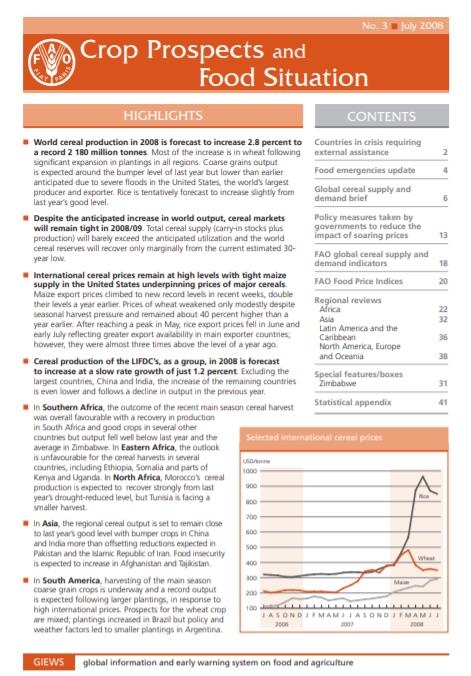
Crop Prospects and Food Situation #3, July 2008
10/07/2008
World cereal production in 2008 is forecast to increase 2.8 percent to a record 2 180 million tonnes. Most of the increase is in wheat following significant expansion in plantings in all regions. Coarse grains output is expected around the bumper level of last year but lower than earlier anticipated due to severe floods in the United States, the world’s largest producer and exporter. Rice is tentatively forecast to increase slightly from last year’s good level. Despite the anticipated increase in world output, cereal markets will remain tight in 2008/09. Total cereal supply (carry-in stocks plus production) will barely exceed the anticipated utilization and the world cereal reserves will recover only marginally from the current estimated 30-year low.
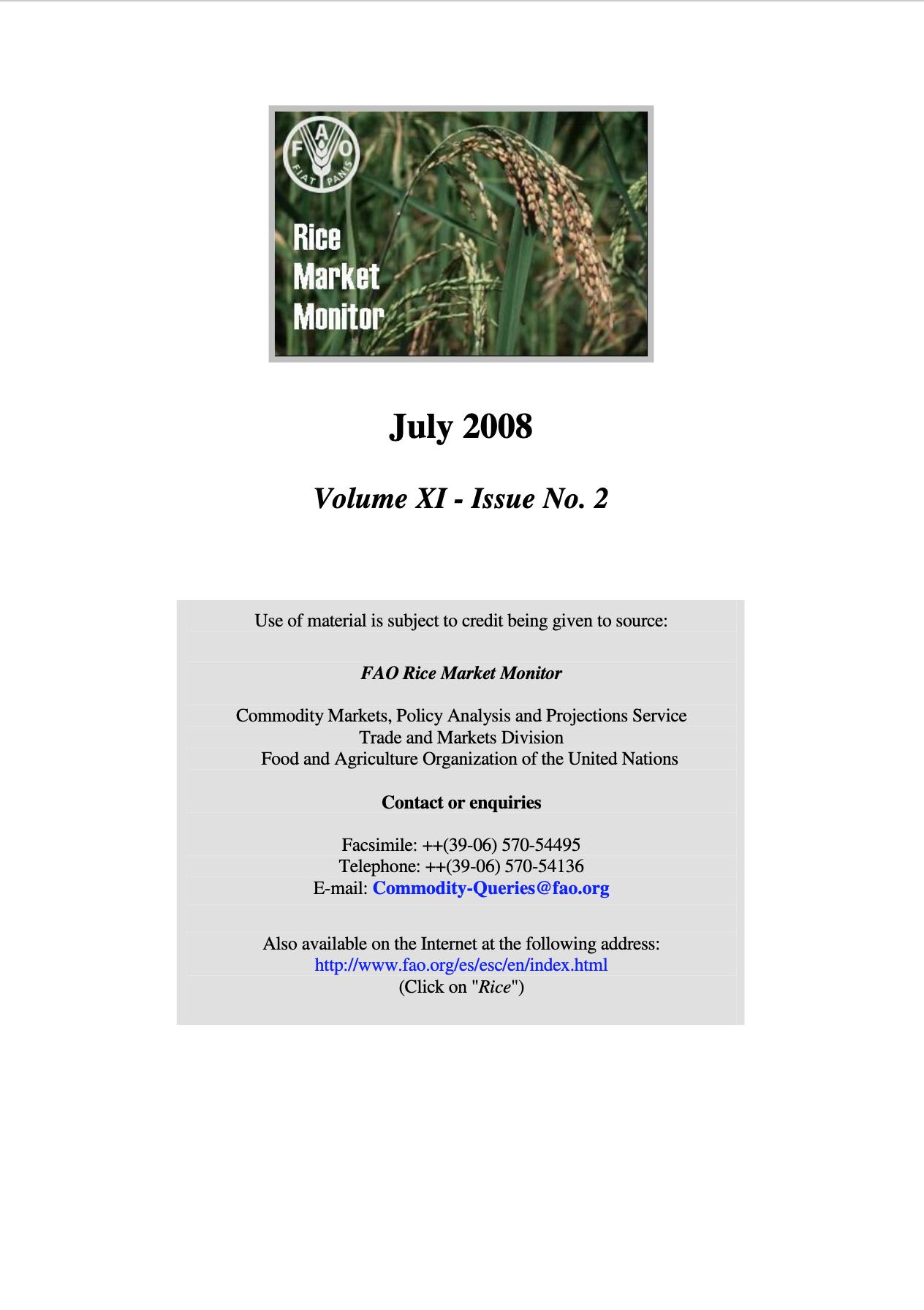
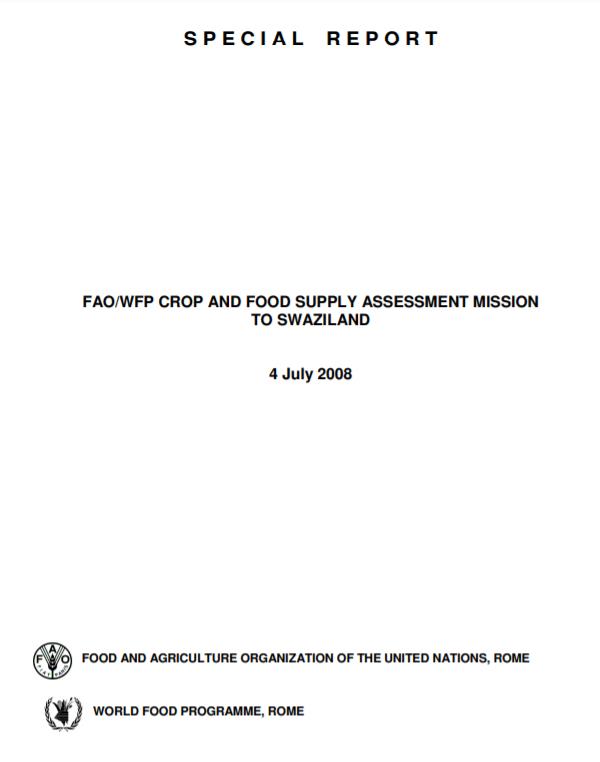
Special Report - FAO/WFP Crop and Food Supply Assessment Mission to Swaziland - 4 July 2008
04/07/2008
An FAO/WFP Crop and Food Supply Assessment Mission (CFSAM) visited Swaziland from 5 to 16 May 2008 at the invitation of the government to estimate the 2007/08 maize harvest, stocks in the country, and import requirements - including food assistance - for the 2008/09 marketing year (April/March). Maize production was extremely low in 2006/07, and it was feared that poor rainfall at the beginning of 2008 might result in similarly low production.
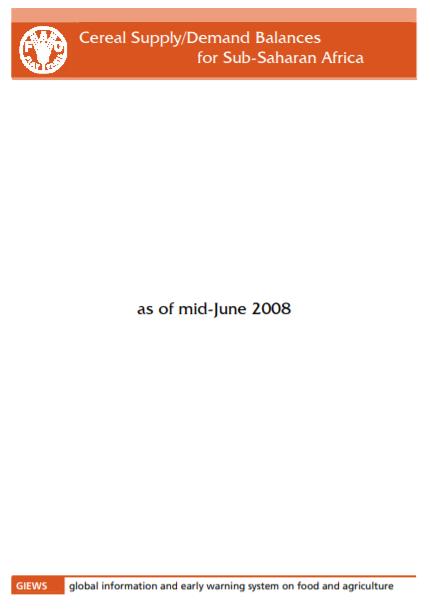
Cereal supply and demand balances for sub-Saharan African countries - No.3, June 2008
19/06/2008
The FAO/GIEWS Country Cereal Balance System (CCBS) is a database of annual supply and utilization balances for main cereals, covering all countries of the world. It has been maintained by FAO/GIEWS since 1980 and is updated on a continual basis. This statistical report, which is a subset of CCBS data, presents the current-year cereal supply and demand balances for all sub-Saharan African countries, highlighting cereal import and food aid requirements of each country. This report is complement ary to the FAO/GIEWS report Crop Prospects and Food Situation and is published four times a year, with the same schedule.
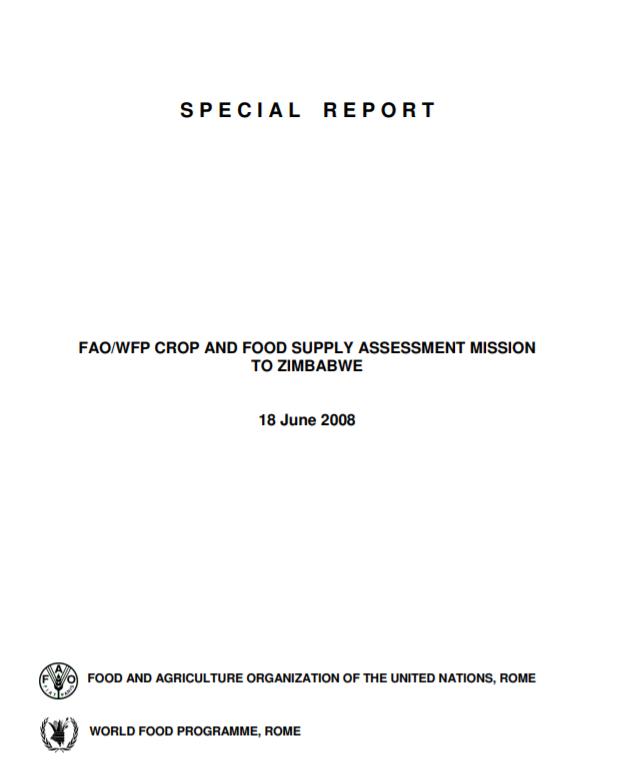
Special Report - FAO/WFP Crop and Food Supply Assessment Mission to Zimbabwe - 18 June 2008
18/06/2008
Zimbabwe experienced incessant rains in the first half of the 2007/08 cropping season during DecemberJanuary causing severe water logging followed by prolonged dry spells, through much of the country compounding the devastating effects of a decade-long economic decline. Against this backdrop an FAO/WFP Crop and Food Supply Assessment Mission (CFSAM) was invited by the Government. The Mission visited the country from 29 April to 23 May 2008 to carry out an independent assessment of the 2008 production of the main cereals, assess the overall food security situation and determine the food import requirement, including food assistance needs, for the current marketing year 2008/09 (April/March). The primary purpose of a CFSAM is to provide an accurate picture of the extent and severity of crisis-induced food insecurity, existing or expected, in the country (or in specific areas) so that timely and appropriate actions can be taken by the government and the international community to minimize the impact of the crisis on affected populations.
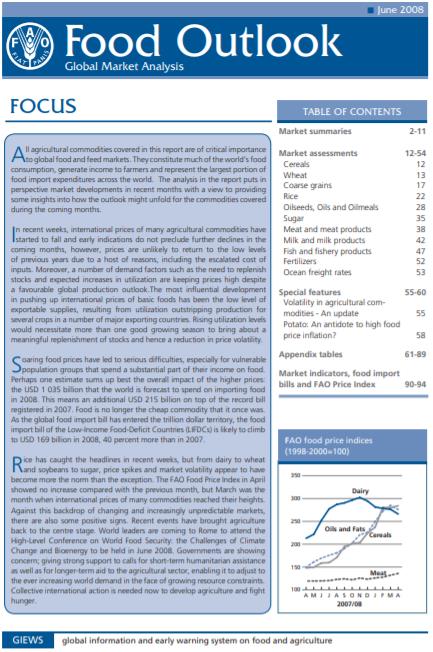
Food Outlook - June 2008
03/06/2008
All agricultural commodities covered in this report are of critical importance to global food and feed markets. They constitute much of the world’s food consumption, generate income to farmers and represent the largest portion of food import expenditures across the world. The analysis in the report puts in perspective market developments in recent months with a view to providing some insights into how the outlook might unfold for the commodities covered during the coming months.
